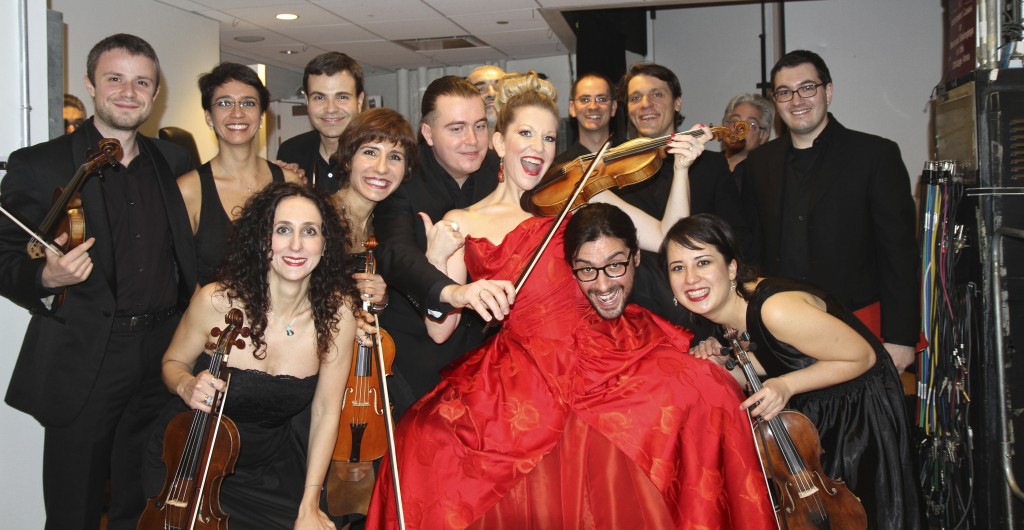Time Travel: via the Royal Waves of Sound
Standing on the stage in Bremen, Germany last week for the second stop of my Drama Queens Tour, I had just finished a nearly two-hour marathon of singing about jealousy, revenge, seduction, lust, despair and marching-off-to-sacrifice-myself-to-appease-those-angry-gods (you know how pesky they can be!). The generous audience was stamping its feet football-style, kindly demanding an encore. There I stood, possessing only a few polite sentences of German in my limited vocabulary, begging their indulgence while I spoke in English, because “the only German I really know are the important words, like bratwurst and brot.”

Photo: QUEEN CITY SAUSAGE (how perfect is that?)
A slight chuckle mercifully rippled through the theater from the normally cool German audience, and so I proceeded to explain the first encore: “This is about a Queen so distraught from a broken heart, that she begs simply to be left alone to weep, and then to die.” (It’s not an unusual request from a Drama Queen in the course of an opera, for we must be given a chance to have our final, valiant, heart-breaking sing, you understand!)
As the first violin set out to raise his bow, sweeping up in intense emotion to set the mood, a low-rumble giggle wafted up from the front row as a very erudite, sophisticated older gentlemen said, “Ha ha ha … bratwurst.”
Me and my big mouth.
The mood may have been broken, but I had found a kindred spirit, to be sure. Laughter aside, I needed to quickly regain my composure to enter back into this world of supreme, utter, total despair — a misery encased in one of the most hauntingly beautiful, sublime melodies I’ve ever had the pleasure to sing,Lasciami piangere. It’s that fabulous, addictive Baroque gimmick where the most acute, excruciating pain is gilded with a sublime, extraordinary, time-stopping beauty of pure, simple melody.
So we did our thing of weeping and dying, and the resulting hush from the audience was electric. In the world of classical music, often we are busy revisiting the classics over and over again (they are classics for a reason), yet for this piece, even among these great connoisseurs of classical music in the audience, not a soul could possible have known this melody, for it had been laying in obscurity on a dusty library shelf for, most likely, the better part of nearly two centuries. (Can you imagine 200 years from now, someone “discovering” John Lennon’s “Imagine?”) As the audience slowly began to come to and start a rather stunned round of applause, my eye caught the “Bratwurst Gentleman,” and there he was, bent in two, as if in agony. As he slowly lifted himself back up, he revealed a beet red face with tears pouring down his cheeks. He was inconsolable.
I’ve never seen quite such a visceral reaction to a piece of music before, and it moved me greatly. I was immediately overcome with the sensation of how time no longer existed — it was as if the composer, Reinhard Kaiser (1674-1739), was standing among us via this transportive melody, carrying with it a timeless sentiment of sorrow, of grief and that universal, deep desire to connect.
THIS is what completely IGNITES my passion as a singer and as a woman: the idea that through this magical, mystical, masterful world of opera, an often stubborn, buried portal of feeling deep within us can be unleashed via the true, raw emotions carried to us on those perfect, vibrating waves of sound, connecting us over the centuries, across gender barriers, political divides, class or culture gulfs, and reminding us that we are all indeed, unquestionably, irrevocably connected.
In a world that somehow feels more divided than ever, culture will be our tonic. Culture, music, the arts — these indispensable behemoths of human creation at its very best teach us about ourselves, about our place in this world, and thankfully shine a spotlight on the fact that we all have MUCH more in common than what seemingly separates us. This is why Opera is thriving. This is why the baroque Drama Queens of 300-400 years ago can reappear and move us to tears, or make us feel like dancing. (Ellen? I’m talking to you, girl!) This is why music is, without a doubt, NECESSARY in our lives — it makes us better human beings, capable of feeling and growing much more than we might do left to our own devices in a world without melody.
I’m Joyce DiDonato, and I am a Drama Queen. Are you?
* This blog entry was written for The Huffington Post, published on November 20, 2012

